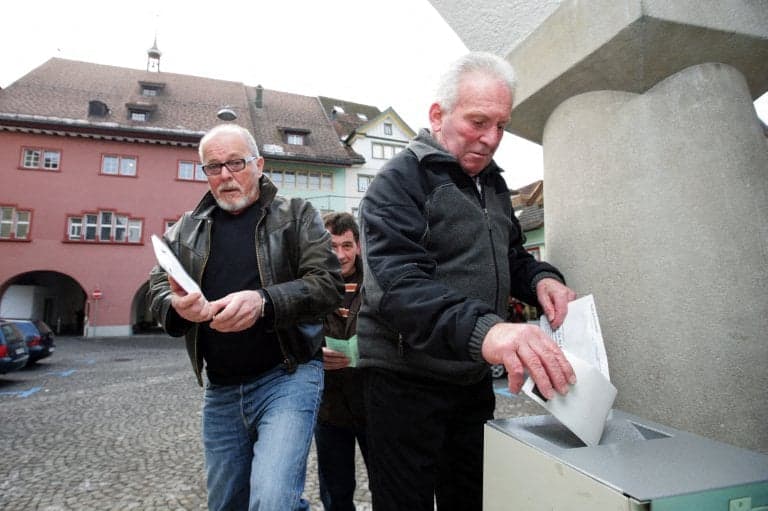Pension payments: What's at stake in Switzerland's March 3rd referendum?

The first of Switzerland’s four rounds of referendums scheduled for 2024 will take place on March 3rd. Two retirement-related issues will be at stake.
AHV /AVS -13 pension
This proposal, created by left-wing parties and trade unions, calls for the payment of an additional pension, of the same amount as the ‘regular’ AHV/AVS pension received each month.
This would correspond to a monthly raise in pensions of 8.33 percent which, according to supporters, is necessary increase to compensate for the inflation-driven higher cost of living and lower purchasing power.
The parliament and the Federal Council urge voters to reject the proposal, arguing that such an increase in public spending would not be financially sustainable.
READ ALSO: What is Switzerland's 13th-month pension plan and why are they voting on it?
For secure and lasting old age provision
This initiative, spearheaded by the liberal-radical party, calls for raising the retirement age for men and women to 66, from the current 65 for men and 64 for women (the latter to go up to 65 in 2025).
Further, the retirement age will be tied to the average life expectancy — that is, it would be automatically raised if life expectancy increases.
The Federal Council and parliament recommend rejecting this measure because basing retirement age on population’s longevity doesn’t take into account social issues or the situation on the labour market.
Who can vote?
Essentially only Swiss citizens will be able to cast their votes on March 3rd, as well as in the three other referendums on June 9th, September 22nd, and November 24th.
Certain cantons allow foreign residents to participate in the political process — with certain restrictions.
The cantons of Fribourg, Vaud, Neuchâtel and Jura allow non-citizens to vote, elect officials, and stand for election at communal level. Conditions vary from one canton to another, but in most cases a certain length of stay and/or a residence permit are required.
In Vaud, for instance, where 30 percent of the population is foreign, immigrants can run for or sit on the communal or Town Council, as well as sign an initiative or a communal referendum.
They must also have had a residence permit for at least 10 years, and live in the canton for at least three years.
All foreign nationals are directly entered in the electoral register once the requirements are met, and automatically receive the official material for votes and elections on a communal level.
Geneva, which has the largest foreign population in Switzerland (45 percent), grants foreigners voting rights at communal level, but they can’t run for office.
READ ALSO: Where in Switzerland can foreigners vote?
Comments
See Also
AHV /AVS -13 pension
This proposal, created by left-wing parties and trade unions, calls for the payment of an additional pension, of the same amount as the ‘regular’ AHV/AVS pension received each month.
This would correspond to a monthly raise in pensions of 8.33 percent which, according to supporters, is necessary increase to compensate for the inflation-driven higher cost of living and lower purchasing power.
The parliament and the Federal Council urge voters to reject the proposal, arguing that such an increase in public spending would not be financially sustainable.
READ ALSO: What is Switzerland's 13th-month pension plan and why are they voting on it?
For secure and lasting old age provision
This initiative, spearheaded by the liberal-radical party, calls for raising the retirement age for men and women to 66, from the current 65 for men and 64 for women (the latter to go up to 65 in 2025).
Further, the retirement age will be tied to the average life expectancy — that is, it would be automatically raised if life expectancy increases.
The Federal Council and parliament recommend rejecting this measure because basing retirement age on population’s longevity doesn’t take into account social issues or the situation on the labour market.
Who can vote?
Essentially only Swiss citizens will be able to cast their votes on March 3rd, as well as in the three other referendums on June 9th, September 22nd, and November 24th.
Certain cantons allow foreign residents to participate in the political process — with certain restrictions.
The cantons of Fribourg, Vaud, Neuchâtel and Jura allow non-citizens to vote, elect officials, and stand for election at communal level. Conditions vary from one canton to another, but in most cases a certain length of stay and/or a residence permit are required.
In Vaud, for instance, where 30 percent of the population is foreign, immigrants can run for or sit on the communal or Town Council, as well as sign an initiative or a communal referendum.
They must also have had a residence permit for at least 10 years, and live in the canton for at least three years.
All foreign nationals are directly entered in the electoral register once the requirements are met, and automatically receive the official material for votes and elections on a communal level.
Geneva, which has the largest foreign population in Switzerland (45 percent), grants foreigners voting rights at communal level, but they can’t run for office.
READ ALSO: Where in Switzerland can foreigners vote?
Join the conversation in our comments section below. Share your own views and experience and if you have a question or suggestion for our journalists then email us at [email protected].
Please keep comments civil, constructive and on topic – and make sure to read our terms of use before getting involved.
Please log in here to leave a comment.